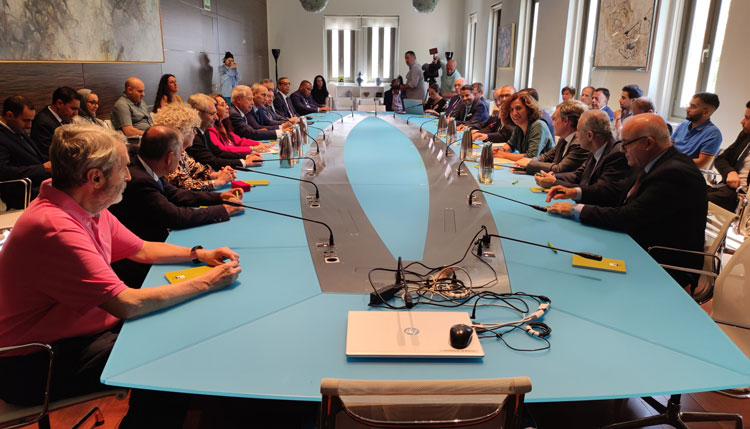Juan David Latorre
Last Wednesday, Casa Árabe hosted the creation of the Morocco Chair at the University of Salamanca (USAL), an event inaugurated by the Director General of Casa Árabe, Irene Lozano, the Ambassador of Morocco, Karima Benyaich, and the Rector of the University, Ricardo Rivero Ortega.
The event was also attended by Alberto Ucelay, Director General for the Maghreb, the Mediterranean and the Middle East, and Rachid El Hour, Professor of Arab and Islamic Studies at USAL, Rector’s Delegate for Relations with Morocco and Director of the Chair, and academics and experts from Morocco and Spain, and representatives of the Royal Academy of Morocco and the National Library of Morocco. The event was attended by the ambassadors of Palestine, Qatar, the Arab League and Kuwait.
The Director General of Casa Árabe, Irene Lozano, opened the event by pointing out that “it is a project that consolidates and reflects years of collaboration and joint work in the field of studies on Morocco and Spanish-Moroccan relations. We believe it is important that this initiative should see the light of day and gain this momentum. There are many centuries of shared history and study, of building bridges between our languages and cultures, which initiatives such as this have continuity and reinforcement”.
For her part, Karima Benyaich, Ambassador of Morocco, said that “this meeting is part of the new stage in relations between Spain and Morocco, which have been strengthened following the visit of President Pedro Sánchez on 7 April last year at the invitation of King Mohamed VI and with an important roadmap, with which a new and very important page has been opened with a great future.”
After highlighting the political and economic stability of her country and the undertaking of major institutional, social and human reforms, the Moroccan ambassador pointed out that “Spanish universities receive more than 190,000 Moroccan students residing in Spain, as well as more than 5,000 Moroccan students who come from there and move to Spain to pursue their university studies. Only by betting on the potential of youth, we will achieve true well-being and sustainable development between our two peoples.”
“The aim of this Chair,” continued the ambassador, “is to deepen mutual knowledge and understanding, knowledge of the two countries and to develop research programmes, academic events, cultural and artistic activities, and all this will contribute to better knowledge and in favour of a better understanding and propagate the true image of Morocco, neighbouring, friendly, modern, moderate and tolerant.”
To conclude, the Director General for the Maghreb, Mediterranean and Middle East, Alberto Ucelay, recalled the words of President Pedro Sánchez and the Minister of Foreign Affairs, José Manuel Albares when they expressed the idea that “Spain and Morocco are on the right path”. “Events like today’s are the best way of expressing and demonstrating this, because it is culture, it is research, it is delving into this common reality.”
The Morocco Chair at the University of Salamanca will be dedicated to studying, analysing and debating Spain and Morocco as a space united by ties of history, culture and civilisation, not only because of what al-Andalus represents for both parties, as a common human heritage, but also because of all that this entails in historical, social and cultural terms. It is part of the university’s long history of promoting Arab studies and relations with the countries of the Mediterranean, especially Morocco.
The University of Salamanca already hosted the creation of the first chair of Arabic in the Iberian Peninsula, the “Trilingual” Chair in 1381, in which Arabic, Hebrew and Chaldean were taught, after the Council of Vienna of 1311-12, in its 24th constitution, ordered the founding of Chairs of Hebrew, Arabic and Chaldean in some universities of the Roman Curia.







